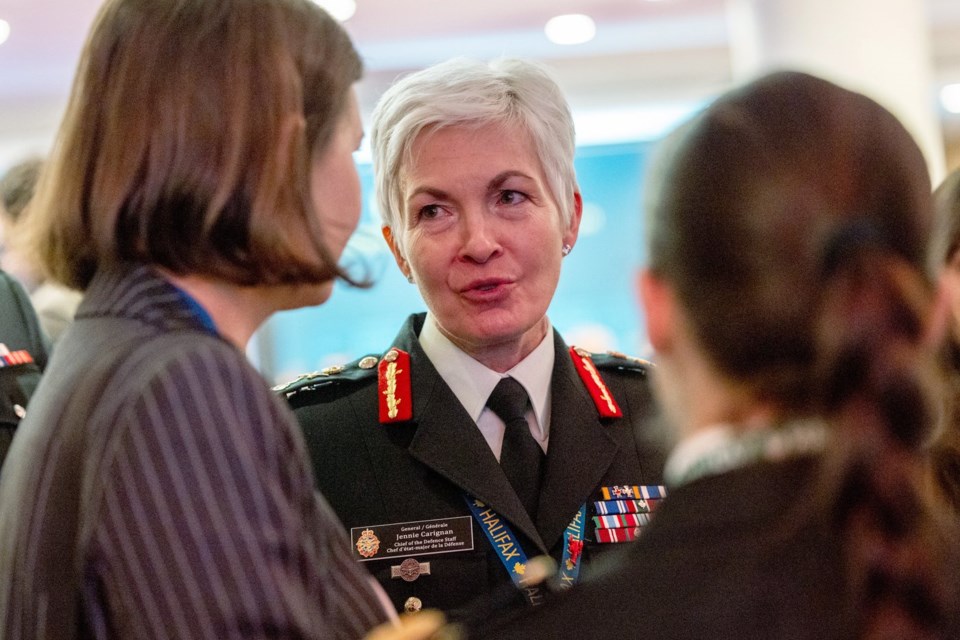HALIFAX — Canada's top general firmly rejected the notion of dropping women from combat roles — a position promoted by president-elect Donald Trump's nominee for defense secretary — at a security forum underway in Halifax on Saturday.
Gen. Jennie Carignan, chief of the defence staff, was responding to Republican Senator James Risch's comments on Friday at the Halifax International Security Forum about Peter Hegseth's opposition to women in fighting units.
Asked about Hegseth's views, the Idaho senator told the roughly 300 delegates the "jury is still out" on how to deal with the "unique situations" that having women in combat creates. He added it was ultimately up to the U.S. military to decide on the issue.
Carignan took a few minutes to address the comments at the beginning of a panel on how western militaries are reacting to the challenge from China, Russia, Iran and North Korea. Her audience included a number of women in uniform.
"I wouldn't want anyone to leave this forum with this idea that women are a distraction to defence and national security," the general said.
"After 39 years of career as a combat arms officer and risking my life in many operations around the world I can't believe that in 2024 we still have to justify the contribution of women ... in the service of their country," she said to a standing ovation.
Hegseth, a former military officer who is a regular Fox News commentator, has said in his book and in interviews that he believes men and women should not serve together in combat units.
On Nov. 7, he told a U.S. podcast that having women in combat roles hasn't made the units more effective or lethal, and "has made fighting more complicated.” Hegseth has also said women have a place in the military, but not in special operations, artillery, infantry and armoured units.
Discussion of Hegseth's position came up during Friday's "chat" between Risch and Democratic party Senator Jeanne Shaheen in the conference's opening panel. Risch is the senior Republican on the Senate's foreign relations committee, and said during the panel he considers Trump to be a friend.
Maj. Anna Novak, a member of the Ukrainian Armed Forces who heard Carignan speak on Saturday, said women play a critical role in combat units in her country.
The head of logistics for a motorized brigade, who has also served with combat units, said, "I know women who are very successfully carrying out their combat duties," adding she is aware of at least 50 women operating drones against the Russian invaders.
"A lot of women join up because they want to protect the most important things in their lives," she said in an interview.
In other panels, the conference heard from a number of panelists that the world had become a more dangerous place as authoritarian states unite to back Russia's war of aggression against Ukraine.
In the day's opening remarks, Mélanie Joly, Canada's minister of foreign affairs, said Russia's ability to invade Ukraine was "only through material support from China, missiles and drones from Iran and troops from North Korea."
The recurring theme at the gathering is that unless Ukraine can win against Russia, other states will be emboldened to violate the territorial integrity of democracies, whether it be China's threats to Taiwan, or both China and Russia making greater claims to territory in the Arctic.
The former president of Taiwan, Tsai Ing-wen, tied together the Ukraine war and the risk of Chinese military aggression in a speech at the conference on Friday evening.
"Our (democratic nations) continued support for Ukraine remains imperative, as a Ukrainian victory will serve as the most effective deterrence against future aggression," she told delegates.
During a panel discussion on the Arctic, Canadian Defence Minister Bill Blair noted that Chinese vessels are mapping the seafloor and gathering intelligence in Arctic waters.
In the same session, U.S. Admiral Linda Fagan, commandant of the U.S. Coast Guard, said there's been "a dramatic shift" in the Chinese and Russian presence in the Arctic.
"Up until this past summer you'd expect one Chinese research vessel in the Arctic; this past summer there were five."
The conference also heard from advocates who have tried to resist repression in non-democratic countries.
The day's opening panel featured Sviatlana Tsikhanouskaya, the exiled opposition leader from Belarus, describing her struggles four years after a 2020 presidential election which was widely denounced as fraudulent.
The eastern European country has maintained many Soviet Union-era restrictions and policies and is often dubbed the continent's last dictatorship. Tsikhanouskaya said she estimates there are close to 500,000 Belarusians now living in exile.
Tsikhanouskaya said the pain felt by her people fuels her to fight on their behalf, and after years of knocking on the doors of western democratic leaders, there are occasional successes.
She gave the example of Lithuania agreeing in September to bring allegations of crimes against humanity against the authoritarian regime of President Alexander Lukashenko.
This report by The Canadian Press was first published Nov. 23, 2024.
-- with files from The Associated Press
Michael Tutton, The Canadian Press



